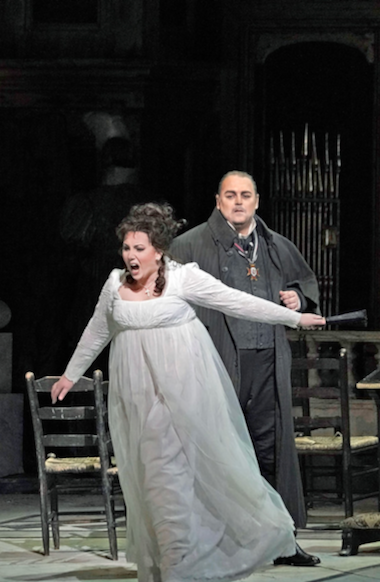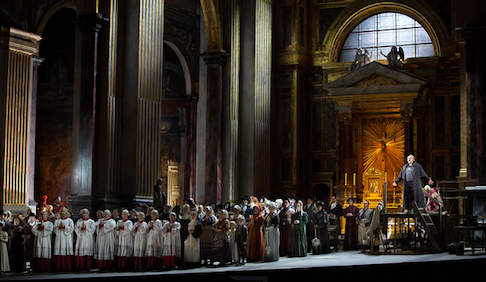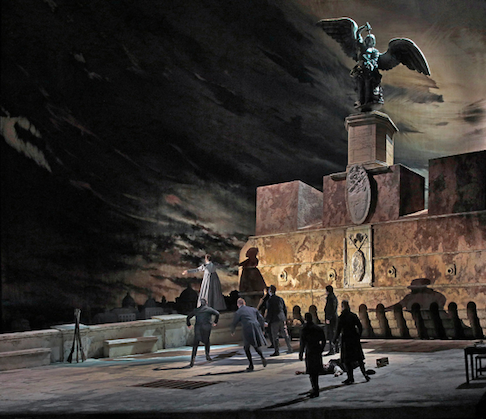Recently in Reviews
English Touring Opera are delighted to announce a season of lyric monodramas to tour nationally from October to December. The season features music for solo singer and piano by Argento, Britten, Tippett and Shostakovich with a bold and inventive approach to making opera during social distancing.
This tenth of ten Live from London concerts was in fact a recorded live performance from California. It was no less enjoyable for that, and it was also uplifting to learn that this wasn’t in fact the ‘last’ LfL event that we will be able to enjoy, courtesy of VOCES8 and their fellow vocal ensembles (more below …).
Ever since Wigmore Hall announced their superb series of autumn concerts, all streamed live and available free of charge, I’d been looking forward to this song recital by Ian Bostridge and Imogen Cooper.
The Sixteen continues its exploration of Henry Purcell’s Welcome Songs for Charles II. As with Robert King’s pioneering Purcell series begun over thirty years ago for Hyperion, Harry Christophers is recording two Welcome Songs per disc.
Although Stile Antico’s programme article for their Live from London recital introduced their selection from the many treasures of the English Renaissance in the context of the theological debates and upheavals of the Tudor and Elizabethan years, their performance was more evocative of private chamber music than of public liturgy.
In February this year, Albanian soprano Ermonela Jaho made a highly lauded debut recital at Wigmore Hall - a concert which both celebrated Opera Rara’s 50th anniversary and honoured the career of the Italian soprano Rosina Storchio (1872-1945), the star of verismo who created the title roles in Leoncavallo’s La bohème and Zazà, Mascagni’s Lodoletta and Puccini’s Madama Butterfly.
Evidently, face masks don’t stifle appreciative “Bravo!”s. And, reducing audience numbers doesn’t lower the volume of such acclamations. For, the audience at Wigmore Hall gave soprano Elizabeth Llewellyn and pianist Simon Lepper a greatly deserved warm reception and hearty response following this lunchtime recital of late-Romantic song.
Collapsology. Or, perhaps we should use the French word ‘Collapsologie’ because this is a transdisciplinary idea pretty much advocated by a series of French theorists - and apparently, mostly French theorists. It in essence focuses on the imminent collapse of modern society and all its layers - a series of escalating crises on a global scale: environmental, economic, geopolitical, governmental; the list is extensive.
For this week’s Live from London vocal recital we moved from the home of VOCES8, St Anne and St Agnes in the City of London, to Kings Place, where The Sixteen - who have been associate artists at the venue for some time - presented a programme of music and words bound together by the theme of ‘reflection’.
'Such is your divine Disposation that both you excellently understand, and royally entertaine the Exercise of Musicke.’
Amongst an avalanche of new Mahler recordings appearing at the moment (Das Lied von der Erde seems to be the most favoured, with three) this 1991 Mahler Second from the 2nd Kassel MahlerFest is one of the more interesting releases.
‘And there was war in heaven: Michael and his angels fought against the dragon; and the dragon fought and his angels, And prevailed not; neither was their place found any more in heaven … that old serpent … Satan, which deceiveth the whole world: he was cast out into the earth, and his angels were cast out with him.’
If there is one myth, it seems believed by some people today, that probably needs shattering it is that post-war recordings or performances of Wagner operas were always of exceptional quality. This 1949 Hamburg Tristan und Isolde is one of those recordings - though quite who is to blame for its many problems takes quite some unearthing.
There was never any doubt that the fifth of the twelve Met Stars Live in Concert broadcasts was going to be a palpably intense and vivid event, as well as a musically stunning and theatrically enervating experience.
‘Love’ was the theme for this Live from London performance by Apollo5. Given the complexity and diversity of that human emotion, and Apollo5’s reputation for versatility and diverse repertoire, ranging from Renaissance choral music to jazz, from contemporary classical works to popular song, it was no surprise that their programme spanned 500 years and several musical styles.
The Academy of St Martin in the Fields have titled their autumn series of eight concerts - which are taking place at 5pm and 7.30pm on two Saturdays each month at their home venue in Trafalgar Square, and being filmed for streaming the following Thursday - ‘re:connect’.
The London Symphony Orchestra opened their Autumn 2020 season with a homage to Oliver Knussen, who died at the age of 66 in July 2018. The programme traced a national musical lineage through the twentieth century, from Britten to Knussen, on to Mark-Anthony Turnage, and entwining the LSO and Rattle too.
With the Live from London digital vocal festival entering the second half of the series, the festival’s host, VOCES8, returned to their home at St Annes and St Agnes in the City of London to present a sequence of ‘Choral Dances’ - vocal music inspired by dance, embracing diverse genres from the Renaissance madrigal to swing jazz.
Just a few unison string wriggles from the opening of Mozart’s overture to Le nozze di Figaro are enough to make any opera-lover perch on the edge of their seat, in excited anticipation of the drama in music to come, so there could be no other curtain-raiser for this Gala Concert at the Royal Opera House, the latest instalment from ‘their House’ to ‘our houses’.
"Before the ending of the day, creator of all things, we pray that, with your accustomed mercy, you may watch over us."
Reviews

01 Apr 2019
Tosca at the Met
The 1917 Met Tosca production hung around for 50 years, bested by the 1925 San Francisco Opera production that lived to the ripe old age of 92. The current Met production is just 2 years old but has the feel of something that can live forever.
David McVicar and his designer John MacFarlane created a timeless Tosca — the Napoleonic wars alive in Michelangelo’s Farnese Palace, in the 17th century basilica Sant’Andrea della Valle, and even in Hadrian’s 2000 year-old tomb (now Castel Sant'Angelo). Tosca is Rome.
It is a not-too-subtle Rome. The massive stage opening of the Met was filled with architecture that exaggerated the Baroque massiveness of St. Andrea della Valle. This masculine world of the church became as well an expanse for the boundless desire of Rome’s chief-of-police, Scarpia. We did not see the details that illustrate the story (the painting, the picnic basket, etc.). But we did feel the threat of this space that rendered the diva Floria Tosca very vulnerable.
 The Te Deum
The Te Deum
The Farnese Palace was present in its spirit, not its architecture. Its famed fresco “The Loves of the Gods” extended in exaggerated perspective along one wall. A huge fireplace, votive candles and candle chandeliers spread through the huge dark space created a massive chiaroscuro where Tosca’s anima exploded.
The massiveness of Sant Angelo on the other hand was greatly diminished. A small terrace was its only architectural feature and only a small, morning sky floated in the now massive blackness of the Met stage house. The smallness of the space provided context for Tosca and Cavaradossi’s discussion of intimacies of the bloody murder. Tosca’s leap was but a small step into this void, an intimate, spectacular slide into nothingness.
 The leap
The leap
David McVicar’s Rome was not mere background for Puccini’s intense reading of Sardou’s play. Rome was the dominant player in this drama of release that has become the most famous of all operatic rituals, that has created a cult of Tosca followers. And that’s all of us — the entire corpus of the opera audience who need Puccini’s Rome to embody the world from which we must (and will ultimately) escape.
The powerful Rome that this Tosca set creates demands powerful singers to inhabit its vastness. This was fulfilled in the four spring performances conducted by Carlo Rizzo who aided and abetted the three principals to create personages of impressive magnitude. American soprano Jennifer Rowley embodied a Tosca flooded by a huge spectrum of emotions, from the playfulness of diva attitudes in the first act to her murderess fury in the second act and finally the complexities of the third act. Mme. Rowley’s voice has a fast flutter that served to create an exaggerated singerly presence for Tosca. She has a surcharge of vocal heft to ride above the climaxes, and artistry that made her “Vissi d’arte” a show stopper.
German bass-baritone Wolfgang Koch created a unique Scarpia, one who seemed to almost speak his words in Puccini’s threatening vocal lines, his massively powerful physical size added to the menace of his character. Mr. Koch’s Scarpia is not a subtle creature, he is the ultimate predator, and Puccini provides him ample of opportunity to brag about it.
Tenor Joseph Calleja more naturally plays the role of a tenor rather than he played the painter Cavaradossi. Fortunately he is a good tenor so his instinct to turn to face the audience when he has a high note, and to hold it long enough to be doubly sure that we know he has powerful, secure high notes, was not as annoying as it might have been.
Mr. Calleja is the Cavaradossi this coming July at the Aix-en-Provence festival in a mise en scène of Tosca by French director Christophe Honoré. This director set his Aix Cosi fan tutte in Ethiopia, his Lyon Don Carlo amidst theater drapes on an otherwise empty stage. Thus we nervously await the Rome (if Rome) he will conjure for this Aix Tosca, into which he must slip tenor Calleja. It may be worth the trip just to find out.
Michael Milenski
Cast and production information:
Floria Tosca: Jennifer Rowley; Cavaradossi: Joseph Calleja; Baron Scarpia: Wolfgang Koch; Sacristan: Philip Cokorinos; Spoletta: Tony Stevenson; Sciarroe: Bradley Garvin. Chorus and orchestra of the Metropolitan Opera. Conductor: Carlo Rizzi; Production: David McVicar; Set and Costume Design: John MacFarlane; Lighting Designer: David Finn; Revival Stage Director: Jonathon Loy. Metropolitan Opera, New York, March 29, 2019.


